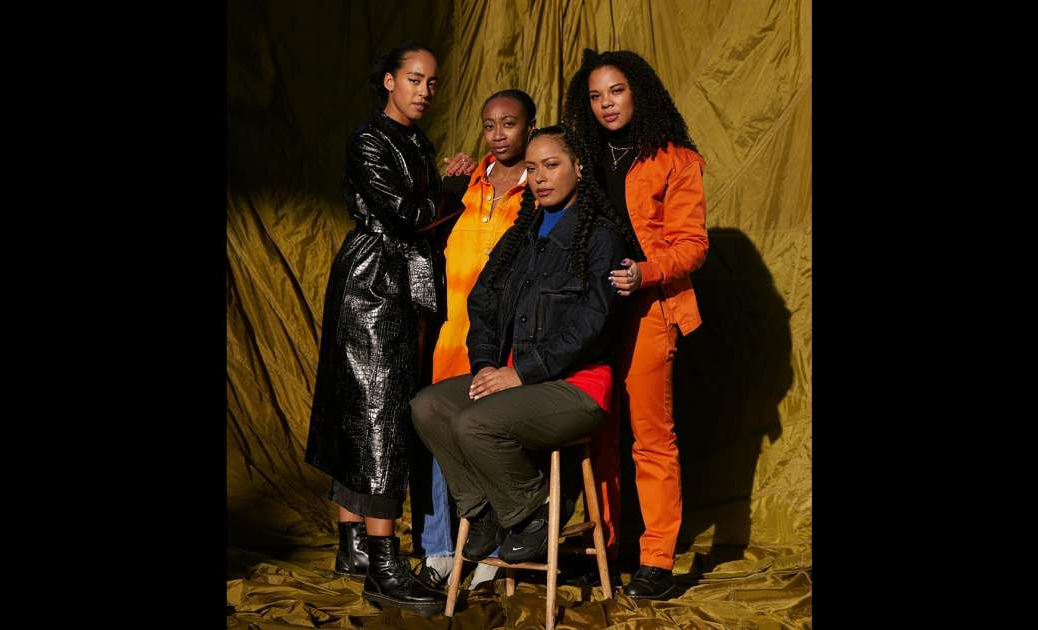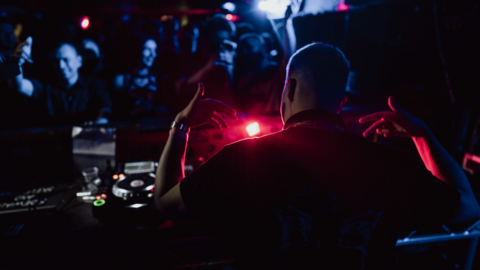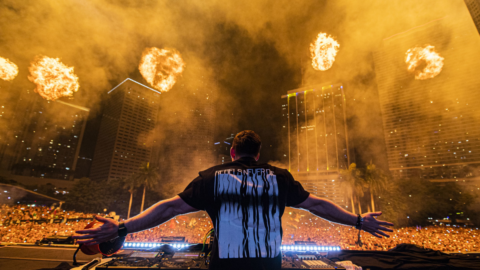Dance music was noticeably absent from the Music Of Black Origin Awards for more than a decade — this year, the Black Electronic Music Association helped change that
Behind the scenes of social change is where we often find some of the most marginalised people, who work tirelessly without credit. This year, as we celebrate dance music’s inclusion in the MOBO Awards – Music Of Black Origin – the same structures that led to its exclusion are being challenged by Club BEMA, who are at the forefront of this change.
BEMA, the newly formed Black Electronic Music Association, was set up by four dance music powerhouses: Hannah Shogbola, who is an agent, manager and owner of creative consultancy DAJU; Heléna Star, a DJ, presenter and broadcaster on Foundation FM; Jaguar, a DJ, broadcaster on BBC Radio One Introducing Dance; and NIKS, a DJ, co-founder of Black Artist Database and a Rinse FM host. Between them, they have worked in every corner of the industry, both in front and behind the scenes.
Their founding mission statement is simple: they are four Black women who want to highlight, acknowledge and honour the Black roots of many electronic music genres and the wealth of Black talent existing across the industry. They’re already achieving success: working to get dance music back into the MOBOs, the leading awards show for honouring Black music in the UK.
The ceremony has featured dance and electronic categories in the past: its launch year in 1996 had awards for Best Dance Act, Best Jungle Act and Best DJ. By 2000, this representation had dwindled with all three categories gone. In their place, there was a short-lived Best Garage Act category, which ran from 2000 to 2003, alongside DJ awards of various names which ran until 2008. For more than a decade now, an explicit category for dance music has been absent, with grime being the only electronic music included.
Considering dance music is explicitly Music Of Black Origin, its lengthy omission from the MOBO Awards has been puzzling, and goes far beyond simple ignorance. If you look around, from the underground to the mainstream, dance music is everywhere.
‘B.O.T.A (Baddest Of Them All)’ by Eliza Rose and Interplanetary Criminal recently topped the UK charts, dance music plays across every major radio station — you know what, you can even hear it while you do your weekly shop. Amapiano has become synonymous with the London scene, thanks to a thriving South African diaspora pushing the sound, Afrobeats can be heard on our adverts, and we’re fortunate to have a thriving underground music scene with house and techno dominating clubs across the UK and beyond. So why haven’t the MOBOs been taking notice? That’s a question Club BEMA raised with the organisation.
Read this next: The ‘B.O.T.A’ effect: Why Eliza Rose’s chart-topping club track has captured the nation
Their work built on rumblings of discontent that had been building for years. After the MOBOs went on hiatus between 2017 and 2019, 2020 became the year we all expected a huge relaunch, a fresh new look and a changed attitude. But dance music was once again excluded. That year, BEMA’s Heléna Star and Jaguar penned an op-ed in Mixmag outlining the community’s needs after several conversations with fellow Black peers. The overarching feeling was that more needed to be done to reflect Black dance artists in the mainstream.
“We had Goldie winning Best Jungle Act and Best Album. So Solid Crew won Best UK Garage Act in 2001, and ’Best Newcomer, Oxide & Neutrino won Best Video, DJ Spoony and Craig David also won Best UK Club DJ and Best UK act, as well as Ms Dynamite and Kele Roc winning Best Single, but by the early ‘00s any dance references and categories were taken out of the show entirely,” reflect the founders of BEMA. This is when they began to pose the question, “when did dance music stop being Black music?”
“It literally came from the Black and Brown LGBTQ+ community and this lack of representation felt wrong and not a reflection of the Black experience,” they note. Other voices within the dance sphere felt the same: earlier this year, Nia Archives penned an open letter calling out the MOBOs for its lack of dance and electronic representation. “Time are changing – what side of history do you want to be on?” she questioned.
BEMA took their enquiries straight to the source. “We had an honest and open conversation about reinstating the category, and worked with them to recommend a huge list of Black dance artists that deserve to be spotlighted, so they could get an idea of just how vast and impressive our scene is.” Their productive experience reflects how change can be collectively possible. How much our dance music scene has grown and flourished, as well as the potential it has to hit the mainstream and remain there.
“Spotlighting and reflecting Black artists comes naturally to all four of us,” the group relays, “so the conversation to merge our strengths together, start BEMA and work with MOBO happened very naturally.” Each member of the group has individually pushed their section of the industry forward. Jaguar this year saw the release of her comprehensive and timely report into gender-based discrimination within the music industry; NIKS has been educating the masses with the Black Artist Database; inclusivity across all fronts drives every thing Heléna Star does; and as one of the only Black woman agents in the UK, Hannah Shogbola is setting a new precedent.
Read this next: Why we started the Black Artist Database
Reiterating the importance of spotlighting Black talent, they say: “It’s time to truly elevate and honour all of the individuals – past and present – who have been key contributors to the UK electronic and dance music scene.” Here they point to NIKS’ recent contribution to the FOLD Talks series “Nourishing the Roots” alongside key Black voices Lois Browne aka LO-LOW, DJ Winggold and Jordan Wadeh.
The “need” for these conversations to be ongoing is made clear. “The UK appears to be rather divorced from the history and roots of dance music and its genesis in Black and queer communities”. Since June 2020, it’s become near impossible to deny the Black roots of dance music, but we have seen a refusal to support the Black present and future. Expanding on this, Club BEMA speak on their existing ground work on centering Blackness and their collective strengths: “Combining our knowledge and individual work in the scene, focusing on uplifting Black voices and narratives — it made so much sense, not only as individuals who circulate in the scene in this way but as friends – to work together to do more vital work.”
Putting their collective voices together and achieving success is amazing and inspiring to me. “Kanya King and her team listened to us and asked us to put a voting committee together and reach out to ask them to vote. This includes Goldie, Smokin Jo, DJ EZ, Judy Griffith, Funk Butcher, and many more.” Using their social networks, and vast relationships in every sector, they were able to form a strong committee of knowledgeable industry heads, many with decades of experience, including Carin Abdulá of Outer Agency and Tresor, Tony Nwachukwu of CDR, radio broadcasters like Jamz Supernova, Emerald and MistaJam, and legendary DJs such as Carl Cox, Paulette and DJ Flight. Together they picked the nominees for the Best Dance/Electronic Act 2022 category: Anz, Eliza Rose, FKA Twigs, Jax Jones, Nia Archives and SHERELLE.
Speaking on the process, BEMA say: “It was incredibly inspiring. We spent a great deal of time developing our committee and tapping into our rich and diverse network. Many of us had relationships with the MOBOS having worked with different members before; it was about understanding each other’s wants and needs, but most importantly the artists we were trying to shine a light on.”
Read this next: Kevin Saunderson: “Black people don’t even know that techno came from Black artists”
The erasure of Black contributions to dance music can be felt all round. We’re missing from top leadership positions, are not heavily featured on line-ups, and having to constantly fight against racism takes its toll. But Club BEMA’s committee speaks of an exciting possible future.
“It was important to the BEMA that we ensured the right people were asked to be part of the MOBO committee. This delved across multiple genres, heads of the scene, emerging talent, industry professionals and more! We have suffered years of whitewashing within this space so the whole process was really therapeutic”.
Collectively they’ve managed to break down barriers and work together to have dance and electronic music included in the MOBOs, but their work doesn’t end there. Looking towards the future, they each lay out their hopes and visions. For Jaguar, representation and platforming artists is key, as well as “uniting the incredible Black electronic artists out there and continuing to fight the good fight”, whereas for Helena, “we need to continue the important discourse while providing support for those who may not be able to use their voice”.
Continuing this sentiment, Hannah stresses, “the future of the BEMA is to continue our work as a key partner for the MOBOs, but also branch out and continue to develop our mission to one day have our very own Black Electronic Artist Music Awards.” A closing remark from NIKS sums up their own mission: “We need to push through the current systems at play and help to pave the way for our electronic heroes from the past, present and future.”
Yewande Adeniran is a DJ and freelance writer, follow them on Twitter
A weekly rundown of everything you need to know in music and culture
Mixmag will use the information you provide to send you the Mixmag newsletter using Mailchimp as our marketing platform. You can change your mind at any time by clicking the unsubscribe link in the footer of any email you receive from us. By clicking sign me up you agree that we may process your information in accordance with our privacy policy. Learn more about Mailchimp’s privacy practices here.












